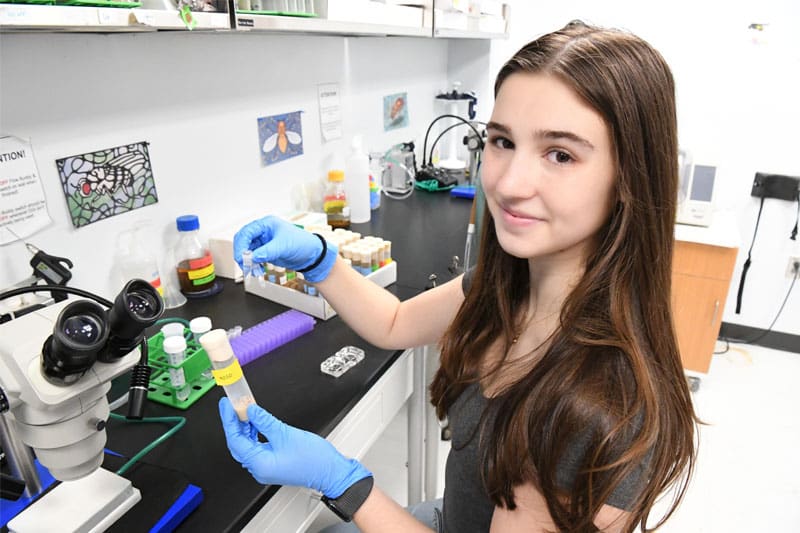
When Bella Rowe ’27 is working on some of her more tedious tasks in the lab, her preferred form of entertainment is listening to “This Podcast Will Kill You.”
“It’s about different infectious diseases and the biological processes behind them, how they spread, how they affect people. I think that’s really, really interesting,” says the molecular and cellular biology major, who conducts microbiome and infectious disease research in the lab of Assistant Professor Nichole Broderick. She studies gut inflammation in Drosophila melanogaster, otherwise known as fruit flies.
Learning about LITAF
Rowe and her fellow researchers are studying a protein called LITAF, which helps the body respond to infections and inflammation. In people, LITAF seems to be linked to gut diseases like ulcerative colitis and Crohn’s disease, but scientists still don’t fully understand its role. To learn more, researchers study fruit flies, which have a gene similar to the human LITAF gene. Specifically, Rowe’s research focuses on a particular mutant fly with changes in this gene to see how it reacts to gut inflammation.
Using a chemical called DSS that mimics ulcerative colitis, she observed how the mutant flies survived and how many bacteria were in their guts, compared with normal flies and flies with weakened immune systems. She found that survival differences were more due to the fly strain than the DSS treatment.
Next steps
These results were unexpected, says Rowe, who presented her findings at the DREAMS undergraduate research symposium last spring, and at JHU TriBeta, the National Biological Honor Society. Among the mutant flies (both the control group and those dosed with DSS), both groups had the same survival rates. “We were expecting to see that the control group had a higher survival [rate],” she says. “And in both cases, our mutant fly had a much lower survival than our control flies that have an active version of the LITAF protein,” she says. “That tells us that the issue these flies are having is with their overall mortality rate.”
Since the survival of the mutant flies didn’t seem to be directly affected by the gut inflammation, Rowe’s next step is to explore whether this mutation affects the flies’ overall lifespan.
“If we find a really interesting result in the fruit flies, we can move on to a model organism that’s more similar to humans,” she says.




